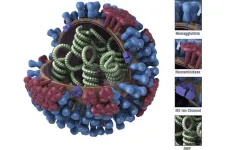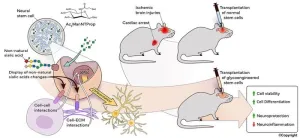Earth System Models – complex computer models which describe Earth processes and how they interact – are critical for predicting future climate change. By simulating the response of our land, oceans and atmosphere to manmade greenhouse gas emissions, these models form the foundation for predictions of future extreme weather and climate event scenarios, including those issued by the UN Intergovernmental Panel on Climate Change (IPCC).
However, climate modellers have long faced a major problem. Because Earth System Models integrate many complicated processes, they cannot immediately run a simulation; they must first ensure that it has reached a stable equilibrium representative of real-world conditions before the industrial revolution. Without this initial settling period – referred to as the “spin-up” phase – the model can “drift”, simulating changes that may be erroneously attributed to manmade factors.
Unfortunately, this process is extremely slow as it requires running the model for many thousands of model years which, for IPCC simulations, can take as much as two years on some of the world’s most powerful supercomputers.
However, a study published today in Science Advances by a University of Oxford scientist funded by the Agile Initiative describes a new computer algorithm which can be applied to Earth System Models to drastically reduce spin-up time. During tests on models used in IPCC simulations, the algorithm was on average 10 times faster at spinning up the model than currently-used approaches, reducing the time taken to achieve equilibrium from many months to under a week.
Study author Samar Khatiwala, Professor of Earth Sciences at the University of Oxford’s Department of Earth Sciences, who devised the algorithm, said: ‘Minimising model drift at a much lower cost in time and energy is obviously critical for climate change simulations, but perhaps the greatest value of this research may ultimately be to policy makers who need to know how reliable climate projections are.’
Currently, the lengthy spin-up time of many IPCC models prevents climate researchers from running their model at a higher resolution and defining uncertainty through carrying out repeat simulations. By drastically reducing the spin-up time, the new algorithm will enable researchers to investigate how subtle changes to the model parameters can alter the output – which is critical for defining the uncertainty of future emission scenarios.
Professor Khatiwala’s new algorithm employs a mathematical approach known as sequence acceleration, which has its roots with the famous mathematician Euler. In the 1960s this idea was applied by D. G. Anderson to speed-up the solution of Schrödinger’s equation, which predicts how matter behaves at the microscopic level. So important is this problem that more than half the world’s supercomputing power is currently devoted to solving it, and ‘Anderson Acceleration’, as it is now known, is one of the most commonly used algorithms employed for it.
Professor Khatiwala realised that Anderson Acceleration might also be able to reduce model spin-up time since both problems are of an iterative nature: an output is generated and then fed back into the model many times over. By retaining previous outputs and combining them into a single input using Anderson’s scheme, the final solution is achieved much more quickly.
Not only does this make the spin-up process much faster and less computationally expensive, but the concept can be applied to the huge variety of different models that are used to investigate, and inform policy on, issues ranging from ocean acidification to biodiversity loss. With research groups around the world beginning to spin-up their models for the next IPCC report, due in 2029, Professor Khatiwala is working with a number of them, including the UK Met Office, to trial his approach and software in their models.
Professor Helene Hewitt OBE, Co-chair for the Coupled Model Intercomparison Project (CMIP) Panel, which will inform the next IPCC report, commented: ‘Policymakers rely on climate projections to inform negotiations as the world tries to meet the Paris Agreement. This work is a step towards reducing the time it takes to produce those critical climate projections.’
Professor Colin Jones Head of the NERC/Met Office sponsored UK Earth system modelling, commented on the findings: ‘Spin-up has always been prohibitively expensive in terms of computational cost and time. The new approaches developed by Professor Khatiwala have the promise to break this logjam and deliver a quantum leap in the efficiency of spinning up such complex models and, as a consequence, greatly increase our ability to deliver timely, robust estimates of global climate change.’
Notes to editors:
For media enquiries and interview requests, contact Dr Charlie Rex, Department of Earth Sciences, University of Oxford: charlie.rex@earth.ox.ac.uk
The study ‘Efficient spin-up of Earth System Models using sequence acceleration’ will be published in the journal Science Advances at 19:00 BST / 14:00 ET Wednesday 1 May, 2024 at https://www.science.org/doi/10.1126/sciadv.adn2839 To view a copy of the study before this, under embargo, contact the Science Advances editorial team vancepak@aaas.org or access the Science Advances press package, VancePak, at https://www.eurekalert.org/press/vancepak/
This research was conducted as part of the Agile Initiative at the Oxford Martin School, with funding from the Natural Environment Research Council (NERC).
About the University of Oxford
Oxford University has been placed number 1 in the Times Higher Education World University Rankings for the eighth year running, and number 3 in the QS World Rankings 2024. At the heart of this success are the twin-pillars of our ground-breaking research and innovation and our distinctive educational offer.
Oxford is world-famous for research and teaching excellence and home to some of the most talented people from across the globe. Our work helps the lives of millions, solving real-world problems through a huge network of partnerships and collaborations. The breadth and interdisciplinary nature of our research alongside our personalised approach to teaching sparks imaginative and inventive insights and solutions.
Through its research commercialisation arm, Oxford University Innovation, Oxford is the highest university patent filer in the UK and is ranked first in the UK for university spinouts, having created more than 300 new companies since 1988. Over a third of these companies have been created in the past five years. The university is a catalyst for prosperity in Oxfordshire and the United Kingdom, contributing £15.7 billion to the UK economy in 2018/19, and supports more than 28,000 full time jobs.
END
New computer algorithm supercharges climate models and could lead to better predictions of future climate change
2024-05-01
(Press-News.org)
ELSE PRESS RELEASES FROM THIS DATE:
These communities are most vulnerable to weather-related power outages in New York State
2024-05-01
Weather-related power outages in the United States have become nearly twice as common in the last ten years compared to the previous decade. These outages, which can last most of a day, are more than an inconvenience: lack of power and related indoor temperature discomfort can exacerbate health conditions; lack of power also endangers the lives of people who are reliant on electricity-powered medical devices and/or elevators.
A new study led environmental health scientists at Columbia University ...
New strategy could lead to universal, long-lasting flu shot
2024-05-01
DURHAM, N.C. -- Duke researchers have opened a new avenue in the attack against influenza viruses by creating a vaccine that encourages the immune system to target a portion of the virus surface that is less variable.
Their approach worked well in experiments with mice and ferrets and may lead to more broadly-protective influenza vaccines and less reliance on an annual shot tailored to that year’s versions of the virus. Even with vaccines, influenza kills about a half-million people each year around the world.
This new vaccine approach, described May 1 in the journal Science Translational ...
Mystery behind huge opening in Antarctic sea ice solved
2024-05-01
EMBARGOED: Not for Release Until 14:00 U.S. Eastern Time (19:00 UK Time) on Wednesday, 01 May 2024
Mystery behind huge opening in Antarctic sea ice solved
Researchers have discovered the missing piece of the puzzle behind a rare opening in the sea ice around Antarctica, which was nearly twice the size of Wales and occurred during the winters of 2016 and 2017.
A study published today [1 May 2024] in Science Advances reveals a key process that had eluded scientists as to how the opening, called a polynya, was able to form and persist for ...
Brain imaging study reveals connections critical to human consciousness
2024-05-01
Human consciousness requires arousal (i.e., wakefulness) and awareness
Brain imaging studies over the last decade have produced connectivity maps of the cortical networks that sustain awareness, but maps of the subcortical networks that sustain wakefulness are lacking, due to the small size and anatomic complexity of subcortical structures such as the brainstem
In a magnetic resonance imaging (MRI) study that integrated high-resolution structural and functional connectivity data, researchers mapped a subcortical brain network that is believed to integrate arousal and awareness in human consciousness
In a paper titled, “Multimodal ...
Do earthquake hazard maps predict higher shaking than actually occurred?
2024-05-01
A new study by Northwestern University researchers and coworkers explains a puzzling problem with maps of future earthquake shaking used to design earthquake-resistant buildings.
Although seismologists have been making these maps for about 50 years, they know very little about how well they actually forecast shaking, because large damaging earthquakes are infrequent in any area.
To learn more, the Northwestern research team compiled shaking data from past earthquakes. These include CHIMP (California Historical Intensity Mapping Project) ...
Science has an AI problem. This group says they can fix it.
2024-05-01
AI holds the potential to help doctors find early markers of disease and policymakers to avoid decisions that lead to war. But a growing body of evidence has revealed deep flaws in how machine learning is used in science, a problem that has swept through dozens of fields and implicated thousands of erroneous papers.
Now an interdisciplinary team of 19 researchers, led by Princeton University computer scientists Arvind Narayanan and Sayash Kapoor, has published guidelines for the responsible use of machine learning in science.
“When we graduate from traditional statistical methods to machine learning methods, there are a vastly ...
Study shows a tale of two social media platforms for Donald Trump
2024-05-01
BUFFALO, N.Y. – Truth Social was more effective at driving news attention toward Donald Trump during the 2022 midterm election cycle than Twitter (now known as X) was during the 2016 primary election season, a pattern driven mostly by partisan media on the left and the right, according to a new paper by a University at Buffalo communication researcher.
But that success had limits.
Journalists covered Trump’s social media use differently during those times and across those platforms, directly embedding his Truth Social posts into their stories far less frequently than was the case with his tweets in 2016.
The findings published in the Journal of Information ...
Roadmap to close the carbon cycle
2024-05-01
RICHLAND, Wash.--A major approach to achieving net-zero carbon emissions relies on converting various parts of the economy, such as personal vehicles and heating, to run via electricity generated from renewable sources. But carbon cannot be removed from all parts of society. Plastics, ubiquitous in the modern world, cannot be decarbonized because they are made of carbon-based molecules.
Led by chemist Wendy Shaw of Pacific Northwest National Laboratory (PNNL), a multi-institutional effort has produced a new roadmap to reducing emissions in hard-to-electrify segments of the economy. The multifaceted approach includes developing non-carbon fuels, ...
The Protein Society announces its 2024 award recipients
2024-05-01
LOS ANGELES, CA – The Protein Society, the premier international society dedicated to supporting protein research, announces the winners of the 2024 Protein Society Awards, which will be conferred at the 38th Anniversary Symposium, July 23 – 26, 2024, in Vancouver, Canada. Plenary talks from select award recipients will take place throughout the 3.5-day event. The winners’ scientific accomplishments, described by their nominators below, demonstrate their lasting impact on protein science.
The ...
UMSOM preclinical study finds novel stem cell therapy boosts neural repair after cardiac arrest
2024-05-01
Researchers at the University of Maryland School of Medicine (UMSOM) have identified an innovation in stem cell therapy to regenerate neural cells in the brain after cardiac arrest in an animal model. The study led by Xiaofeng Jia, BM, MS, PhD, FCCM, Professor of Neurosurgery, found that the application of modified sugar molecules on human neural stem cells improved the likelihood of the therapy's success. The application of these sugar molecules both enhanced the stem cells' proliferation and their transition into neurons to help repair critical connections in the brain. The finding could eventually lead to improved recovery of patients ...


